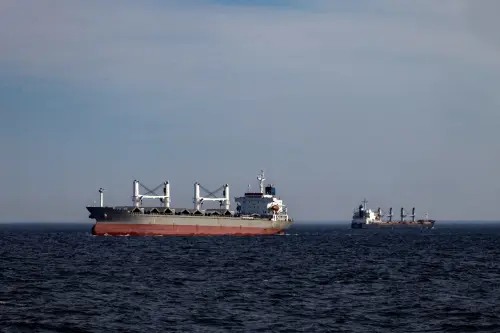Russia announced that the U.S. has agreed to assist in lifting restrictions on food, fertilizer, and shipping companies in exchange for an agreement in the Black Sea.
The U.S. also confirmed a collaboration with Russia and Ukraine to prohibit military strikes on each other's energy installations.
If enacted, these agreements could signify significant progress toward a broader ceasefire, which Washington views as a crucial step toward peace talks aimed at ending Russia's three-year conflict in Ukraine.
Key aspects of the agreements include the U.S. commitment to help restore Russia’s access to global markets for agricultural and fertilizer exports, lower maritime insurance costs, and improve access to ports and payment systems for these transactions.
Russia stated that it has reached an agreement with Washington to ensure the implementation of the Black Sea Initiative. This initiative includes safeguarding navigation in the Black Sea, preventing the use of force, and stopping commercial vessels from being used for military purposes, alongside establishing control measures to inspect these vessels.
The Kremlin indicated that the maritime safety deal would come into effect once specific conditions are met, including the lifting of restrictions and sanctions on a major agricultural bank and exporters of food and fertilizer, as well as on Russian vessels.
Conditions specified for lifting include removing restrictions on state agricultural bank Rosselkhozbank and other financial organizations involved in international food and fertilizer trade, reconnecting them to SWIFT, and opening necessary correspondent accounts.
Additional requirements encompass the elimination of trade finance sanctions and restrictions on companies involved in producing and exporting food and fertilizers, as well as the facilitation of insurance companies working with related shipments.
Moreover, restrictions on the maintenance of ships in ports and sanctions against Russian-flagged vessels involved in the food and fertilizer trade would be lifted, along with constraints on supplying agricultural machinery to Russia and other goods essential for food production.
Washington also mentioned its ongoing commitment to assist Ukraine in facilitating the exchange of prisoners of war, the release of civilian detainees, and the return of forcibly transferred Ukrainian children.
This deal marks a restoration of the Black Sea Initiative established in 2022 with support from Turkey and the United Nations, along with a corresponding three-year memorandum of understanding that aimed to help Russia access foreign markets for its food and fertilizer exports.
Although Russia withdrew from the initiative in 2023, citing significant obstacles to its food and fertilizer exports, it has not encountered major issues with grain shipments via the Black Sea. While these exports are not subject to Western sanctions, Moscow has asserted that restrictions on payments, logistics, and insurance have impeded shipments.
